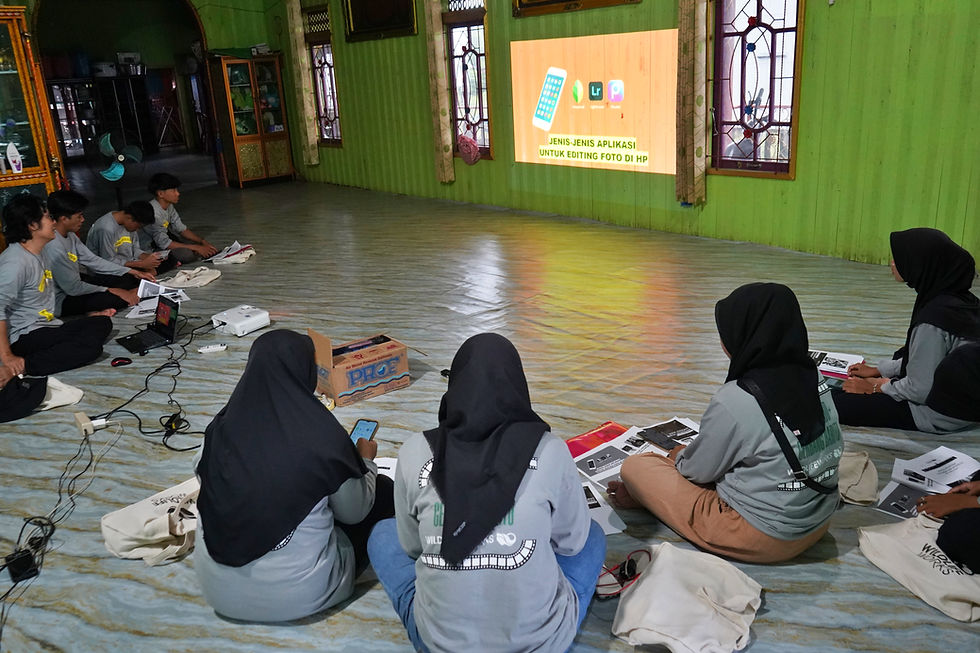The Jojoba Project: Cosmetic and beauty plants benefit rural communities
- Wildlife Works
- 12 Mar 2013
- 4 menit membaca
If you check the ingredient label on your favorite shampoo, lotion or lipstick, it’s very likely you’ll see jojoba listed. The oil pressed from the seeds of this shrub can be used “as is” to soften hair and skin, or can be mixed into different cosmetics as an added moisturizer. Jojoba oil is unique in that it is chemically a liquid wax, not a triglyceride, making it more similar to the natural oil on human skin (sebum) than traditional vegetable oils.
Jojoba shrubs are hardy and can survive in arid climates and rangelands. Plantations of jojoba have been established in a number of desert and semi-desert lands including Argentina, Australia, Israel and the Sonoran Desert covering large parts of Arizona, California and Mexico. The arid savannas of our Rukinga project area have the ideal conditions for jojoba plants to thrive.

Cosmas pruning seedlings
As part of our greenhouse program, Wildlife Works has devoted roughly one hectare to growing jojoba, making Wildlife Works the largest producer of the plant in Kenya!
Currently, oil from the jojoba plants we grow is used in our soap production and is sold to hotels in Kenya. We hope to begin exporting the handmade soaps to sell in the U.S. in the near future.
The supervisor of The Jojoba Plant Project, Cosmas, is a 56-year-old married man with four children (three girls ages 21, 19 and 16, and one 14-year-old boy) living in Maungu, an adjacent town to Wildlife Works. Since 2009 when Cosmas took on the role of supervisor for the plant project, the number of facilities and employees dedicated to the project has risen, and quality of jojoba shrubs has increased. He says the project team is putting in a lot of hard work, knowing that the community will benefit from their success.

Cosmas with the team
Cosmas has been working for Wildlife Works right from our company’s beginning. At first he worked as a casual laborer, then was assigned to the jojoba project. Cosmas was promoted to Jojoba Plant Project Supervisor 2009, after the success of the Kasigau REDD+ Project.
Cosmas is a role model for other workers who wish to grow within the company. Before coming to Wildlife Works he worked in Mbololo, a town 55km from his current home in Maungu, crushing stones and selling them as home construction materials to help support his parents. He completed secondary school levels and wanted to study medicine, but could not afford to pay the school fees. Cosmas used the small amount of money he had saved to pay for driving lessons in hopes of getting a job for one of the driving companies in Mombasa, but even after getting his license he had trouble finding work due to lack of experience. He visited Wildlife Works hoping to find a job as a company driver, but there were no positions available. At the time, our company had openings for casual laborers, so rather than continue searching for a position as a driver, Cosmas accepted the job and began work the very same day.
Cosmas spends his days pruning the jojoba seedlings, attaching tags to the plants in order to identify different growth rates and building micro-catchments around the shrubs. Micro-catchment is a practice to harvest rainwater in arid lands. The workers build up a mound of dirt surrounding the plants in order to trap rainwater close to the roots.
In addition to supervising the jojoba plant project, Cosmas’ responsibilities also include ensuring that all work equipment is well serviced and available for the other workers.
With a supervisor position at Wildlife Works, Cosmas’ life has really changed. He is now able to provide for his family’s needs including food, hospital bills and school fees for his three youngest children. Cosmas has been supporting his father who still lives in Mbololo since his mother passed away.

Micro-catchment

Micro-catchment
Cosmas hopes to see the jojoba plant become a global leader in producing oils and cosmetics.

Watering the seedlings
Cosmas has formed friendships and good relationships with his colleagues, and says he enjoys working at the safe environment provided by Wildlife Works. He has learned a lot about the importance of conserving the environment, including planting and protecting trees, and educating fellow community members on the importance of protecting wildlife. We are proud to have Cosmas leading our team!
* * * * * * * * *
Wildlife Works is the world’s leading REDD+ (Reducing Emissions from Deforestation and Degradation), project development and management company with an effective approach to applying innovative market based solutions to the conservation of biodiversity. REDD+ was originated by the United Nations (UN) to help stop the destruction of the world’s forests.
Over a 15 year history Wildlife Works established a successful model that uses the emerging marketplace for REDD+ Carbon Offsets to protect threatened forests, wildlife, and communities.
The company helps local landowners in the developing world monetize their forest and biodiversity assets whether they are governments, communities, ownership groups, or private individuals.



